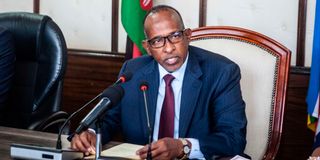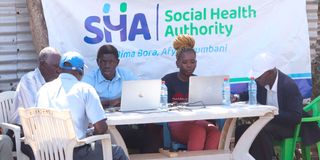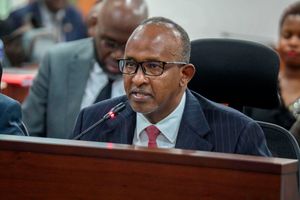
Health Cabinet Secretary Aden Duale addresses journalists at Afya house, Nairobi, on April 17, 2025.
Health Cabinet Secretary Aden Duale has gazetted regulations enabling a Safaricom-led consortium to begin receiving monthly payments for its Sh104 billion investment in a digital health system. The plan is central to President William Ruto’s universal healthcare programme.
Gazetted on April 9, the digital health regulations authorise payments based on agreed milestones, despite an ongoing court case seeking to annul the deal.
The regulations are in two sets – data exchange component and health information management procedures.
Both sets of regulations recognise specific components of the system being built by the Safaricom consortium such as patient and claims registries, telemedicine, health information management system and several others.
“The object of these regulations is to provide for establishment and implementation of the data exchange component of the system and exchange of health information within the system,” Mr Duale says in the digital exchange regulations.
He added that the regulations are intended to ensure the safe management of health data and support the adoption of e-health technologies.
Also Read: Scandal of double SHA deductions
The two documents serve as the legal foundation for implementing the health system, while also outlining the payment framework Safaricom will use to recoup its investment.
The Health CS on Tuesday said that no money has been paid to the consortium, an indication that the Safaricom-led team could be behind schedule in implementing the system.
The payments are to be made against achieving specific milestones indicated in a project plan.
Mr Duale did not share a copy of the project plan, despite our request.
The CS appeared before the National Assembly’s Health Committee on Wednesday, and maintained that the system, which is still under development, is now working seamlessly following the transition from the National Health Insurance Fund.
The consortium is expected to use its money in setting up the system, and then recoup the investment over a 12-year period.
Safaricom PLC has partnered with Konvergenz Network Solutions and UAE’s Apeiro Ltd.
Under the contract signed on August 9, 2024, the consortium was set to receive Sh500 million monthly starting February 2025.
While the procurement and contract signing was between the Ministry of Health and the consortium, the works coming out of the deal fall under the mandate of the Digital Health Agency (DHA).

Elderly persons register for the Social Health Authority (SHA) at Arujo Location Chiefs Camp in Homa Bay Town on March 5,2025.
Starting 2026, the monthly payments were to increase to Sh650 million, and then to Sh900 million in 2027. Between 2028 and 2032, the monthly payments were to hit Sh1.065 billion.
In 2033, the monthly payments would go down to Sh1 billion. Between January and April, 2034 they would drop to Sh900 million. In May, 2034 the Safaricom consortium would receive Sh708.1 million before getting a final Sh500 million installment the following month.
Those payments are pegged on completion and implantation of certain software and physical infrastructure.
Under the contract, the consortium was expected to have the system up and running within the first two years after signing. That means that by August, 2026 the system is intended to be working
The initial investment in the software and necessary infrastructure is set at Sh34 billion.
However, the project faces legal headwinds. In September 2024, Busia Senator Okiya Omtatah filed a petition challenging the legality of both the new Social Health Insurance Fund (SHIF) - the NHIF successor - and the award of the contract to the Safaricom consortium
Mr Omtatah argues that the system will remain the intellectual property of the Safaricom consortium after the Sh104 billion investment is recouped. He adds that the DHA was the agency that should have procured the system, and that SHIF was rolled out without supporting legislation.
Also Read: Create awareness on SHA to end confusion
However, the consortium says the procurement process was followed and that the then Attorney-General, Justin Muturi, gave the green light after his opinion was sought.
It has also asked the court to dismiss the petition.
The Ministry of Health has defended its actions, arguing that the case concerns procurement and not constitutional issues.
To shield the consortium during the repayment period, the contract includes clauses addressing currency fluctuations, tax changes and inflation.
Mr Duale’s assertion that no money has been paid indicates that the Safaricom consortium has not yet met the minimum project implementation threshold to warrant the monthly payments, and which could further delay the 12-year plan.
“There are 38 [sub]systems across the healthcare [system] under the contract. They are in different stages of completion,” Mr Duale said in response to queries on the implementation status of the integrated healthcare system.
A source close to the project told Nation that implementation is lagging and voiced concerns that the newly gazetted regulations might trigger payments before milestones are achieved.
Safaricom has yet to respond to questions about the system’s progress or whether any payments have been received.
Despite the delays, Mr Duale insisted the project remains on course.
"The contract implementation plan is two years. Each subsystem has its own timeline, and all are progressing as per the contracts,” he said.
Safaricom PLC is a public listed company in which the Kenyan government and South Africa’s Vodacom each own 35 per cent stake. Vodafone UK, which owns a controlling stake in Vodacom, owns five per cent.
The other 25 per cent of Safaricom is owned by several local and foreign investors.
Apeiro Ltd, registered in the UAE, is a wholly owned subsidiary of Sirius International Holding.
Sirius International Holding is in turn a subsidiary of International Holding Company (IHC) – one of the largest investment firms in the world.
IHC is listed on the Abu Dhabi stock exchange, with various owners. The UAE royal family owns a substantial stake in the company that has diversified its investments across the world.
Locally, two companies were incorporated to represent Apeiro’s interests in the Safaricom consortium.
Apeiro Holdings Ltd was incorporated on February 15, 2024 with Kenyan Sanjay Lalji Devshi Patel and UK national Shilpa Valji Velji Patel listed as the shareholders.
On July 5, 2024 Apeiro Kenya Technologies Ltd was incorporated with SIH Africa Ltd listed as the only shareholder. Inder Deep Singh Virdi, Judy Mwende Gatabaki, Rufus Maina and Aswanth Bindhu Lambodaran were listed as directors with no shares.
SIH Africa had been incorporated just two days before Apeiro Kenya Technologies Ltd. Mr Lambodaran and Nishant Mishra were the only two shareholders listed.
In late 2024, Apeiro Kenya Technologies Ltd and SIH Africa Ltd were dissolved.
Konvergenz Network Solutions, incorporated on April 2, 2014, is 90 per cent owned by Konvergenz Holding Company.
Pitfield Auto Ltd, incorporated on July 3, 2023, owns a five per cent stake in Konvergenz Network Solutions. Lawyer Dorothy Chepkoech Kipkenda is listed as the sole shareholder and director.
Abdullahi Abdi Sheikh also owns a five per cent stake in Konvergenz Network Solutions.
Konvergenz Holding Company was incorporated on May 17, 2023.
Commtech Consortium Ltd, which was incorporated on March 23, 2023, owns 403 shares in Konvergenz Holding Company Ltd.
Two lawyers at Hamilton Harrison & Mathews, Deborah Linet Ontiri (eight shares) and Peter Okaalet Jr (two shares) are listed as the owners of Commtech Consortium Ltd.
Galva Investments owns 209 shares in Konvergenz Holdings Company Ltd. Lawyer Nuru Said Ahmed is listed as the sole shareholder of Galva Investments.
Abdullahi Abdi Sheikh and Issa Sheikh Mohamed each own 500 shares in Konvergenz Holding Company.










